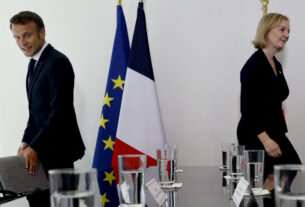NEW YORK — Norwegian Prime Minister Jonas Gahr Støre says his country is open to the previously unthinkable step of imposing price caps on gas to rein in Europe’s energy crisis.
As political leaders, activists and philanthropists piled on the pressure Wednesday to act to limit climate change at U.N. General Assembly events, Støre told POLITICO that “no solution should be off the table,” when asked about a push by some European governments for gas price caps.
“No proposal, no idea” is off limits, he said. “We really have to work on this together.”
Støre sees Europe’s energy crisis as the key plank of what he called “Putin’s war on Europe. They have a military campaign in Ukraine, and they have an energy war in Europe.”
While many European governments support a price cap — including Italy, Poland Belgium, Greece and Sweden — some governments, like Germany, have concerns. With gas in short supply and high demand, some exporters may be tempted to send their gas to other parts of the world if the EU imposes a price cap.
Spanish Prime Minister Pedro Sánchez told POLITICO earlier this week that other radical policy options need to be considered. Sánchez thinks governments need to learn from COVID-19 pandemic responses and coordinate better. “Why don’t we centralize gas purchases, as we did with the vaccines?” he said.
Norway, a major fossil fuel exporter, is struggling to balance the effects of Russia’s war in Ukraine alongside the country’s commitment to go green.
“These very high energy prices in Europe are not good for Norway,” Støre said. “These are our allies and partners. We are not served by their economies being rocked,” he added.
While high prices drive up Norway’s tax revenues — oil and gas companies pay a 78 percent tax to the Norwegian treasury — they drive up domestic prices too. But Støre is undeterred when it comes to making Norway transition to green energy. “We need to scale up the energy transition,” he said.
Sánchez is backing Norway, telling fellow leaders not to get distracted by Russian President Vladimir Putin’s energy tactics: “We have a bigger crisis with climate change,” he told POLITICO.
For now, that transition is unaffordable in many parts of the world. A new Global Leadership Council, co-chaired by Støre and Rockefeller Foundation President Rajiv Shah, aims to change that.
“Six billion people live in energy poverty, and as long as they are energy poor, that will be a major stumbling block for us moving forward on climate,” Støre said.
The council met for the first time Wednesday and is part of the Global Energy Alliance for People and Planet. Its members include World Bank President David Malpass, International Energy Agency boss Fatih Birol, the heads of development banks and Bank of America’s Anne Finucane.
Other groups in New York for the U.N. General Assembly are pushing to change the tone of climate debates, worried that climate action is increasingly becoming a victim of political polarization.
Hannah Jones, CEO of British Prince William’s Earthshot Prize for environmental work, said this fear is a driving force behind the prince’s climate activism. “He felt really clearly that if we didn’t bring urgent optimism into the conversation, we risk people shutting down on us, and not being able to move forward and not take action,” Jones said.
The prince had planned to be in New York to announce the winners of the Earthshot Prize, but the trip was canceled due to the death of his grandmother, Queen Elizabeth II.
Fight over the future
The fraught nature of climate debates was on full display Tuesday.
Climate activist and former U.S. Vice President Al Gore tore into Malpass, demanding his replacement as World Bank president for what Gore described as a lack of climate action at the bank.
Speaking onstage in New York, Malpass repeatedly declined to say he agreed with the scientific consensus that the planet’s climate is changing dangerously. “I’m not a scientist,” Malpass said.
Non-state actors also launched a deluge of climate commitments Wednesday. Amazon and Water.org announced a partnership to provide access to safe water for 100 million people, while a coalition of large companies including Ikea and Unilever committed to taking their most polluting vehicles off the road, and transitioning toward zero-emissions vehicles by 2040.
Antha Williams, head of Bloomberg Philanthropies, which hosted the Earthshot Innovation Summit Wednesday, said the world needs action at all levels to have any hope of sticking to the Paris climate agreement. “We need multilateral collaboration between nation states now more than ever, but they alone are not going to get it done,” she said.
Jones sees the process of identifying the local solutions from Earthshot Prize winners as an important step to change on a bigger scale. “We are a global search engine. We scour the earth for incredible solutions with an eye to diversity and representation,” Jones said.
The goal, she added, is “finding those solutions from the Global South by people that wouldn’t be walking down Sand Hill Road [in Silicon Valley] and bumping into a venture capitalist.”
U.N. Secretary-General António Guterres will push national leaders to make further commitments at an informal leaders roundtable on climate action.
Støre offered fulsome praise to the climate efforts of U.S. President Joe Biden, including the recently passed Inflation Reduction Act. “I can only salute him,” Støre said.




